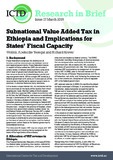| dc.contributor.author | Yesegat, Wollela Abehodie | |
| dc.contributor.author | Richard, Krever | |
| dc.coverage.spatial | Ethiopia | en |
| dc.date.accessioned | 2018-04-06T09:25:47Z | |
| dc.date.available | 2018-04-06T09:25:47Z | |
| dc.date.issued | 2018-03 | |
| dc.identifier.citation | Yesegat, W.A. and Krever, R. (2018) Subnational Value Added Tax in Ethiopia and Implications for States’ Fiscal Capacity, ICTD Research in Brief 17, Brighton: IDS | en |
| dc.identifier.uri | https://opendocs.ids.ac.uk/opendocs/handle/20.500.12413/13613 | |
| dc.description.abstract | Fiscal federalism comprises the distribution of functions and tax revenue sources between central and regional governments. Fiscal federalism issues in respect of value added tax (VAT) do not arise in unitary states; in federal states questions arise as to which level of government should levy the tax, and how revenue should be divided between central and regional governments. While a single VAT levied by a federal government with some, or in one case all, of the revenue being distributed to regional governments is common, in practice there are many variations. China levies a single national VAT, but distributes half the tax to provinces on the basis of the location from which supplies are made. Member states of the European Union (EU) levy separate VATs, subject to conformity with an EU law, the VAT Directive, and revenue is redistributed through a combination of VAT rules and a central clearing house on the basis of place of consumption. Most Canadian provinces impose a surcharge on federal VAT, which is collected by the federal government on behalf of the provinces – except in the province of Quebec, where the provincial government collects Quebec Sales Tax and federal Goods and Services Tax (as VAT is called in Canada), and passes the federal portion on to the central government. The revenue attributable to provincial surcharges is distributed to provincial governments on the basis of place of consumption, and the federal government portion flows to the federal governments consolidated revenue. The bifurcated Ethiopian VAT may be unique, with VAT administration and revenue being assigned on the basis of the legal status of businesses. | en |
| dc.description.sponsorship | Department for International Development | en |
| dc.description.sponsorship | Bill and Melinda Gates Foundation | en |
| dc.language.iso | en | en |
| dc.publisher | IDS | en |
| dc.relation.ispartofseries | ICTD Research in Brief;17 | |
| dc.rights.uri | http://creativecommons.org/licenses/by-nc/4.0/ | en |
| dc.subject | Governance | en |
| dc.title | Subnational Value Added Tax in Ethiopia and Implications for States’ Fiscal Capacity: Research in Brief | en |
| dc.type | Series paper (IDS) | en |
| dc.rights.holder | IDS | en |
| dc.identifier.team | Governance | en |
| rioxxterms.version | NA | en |


